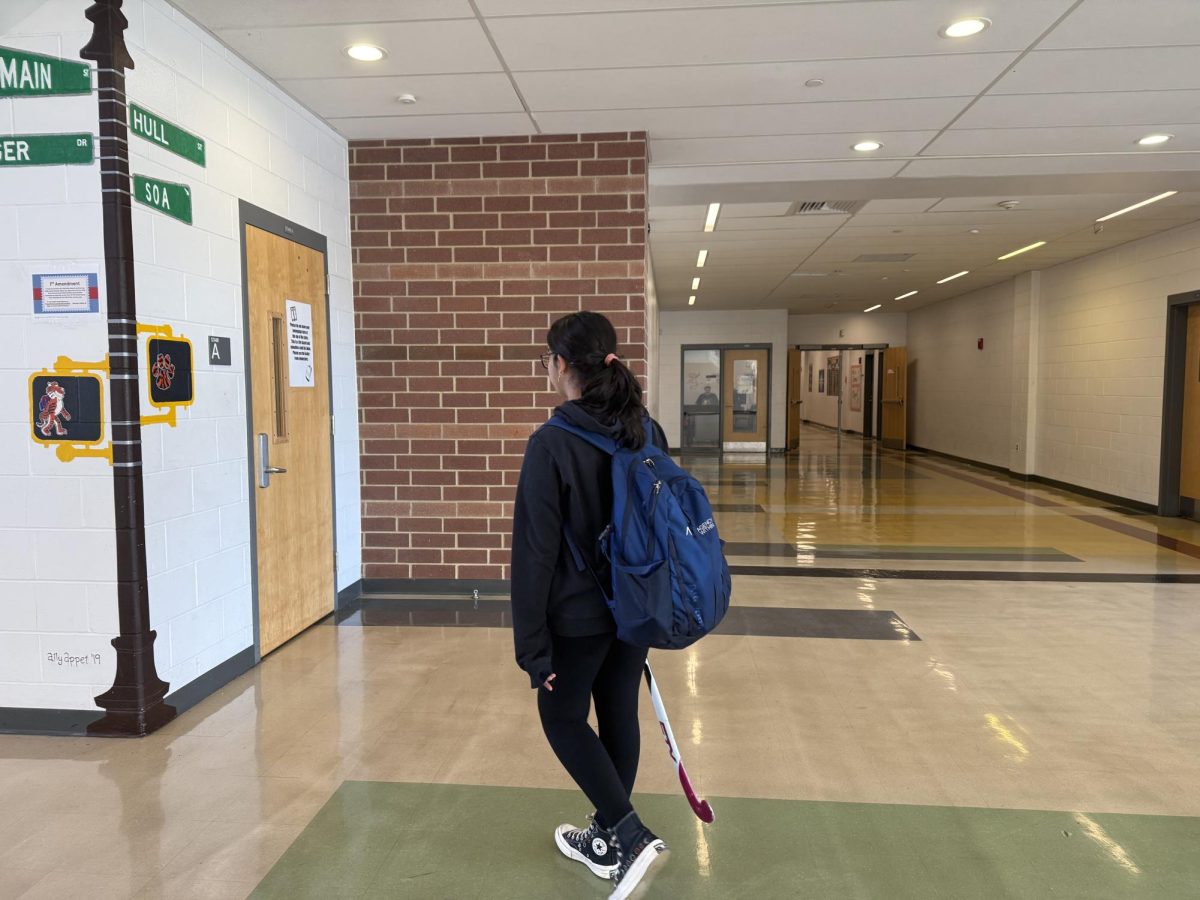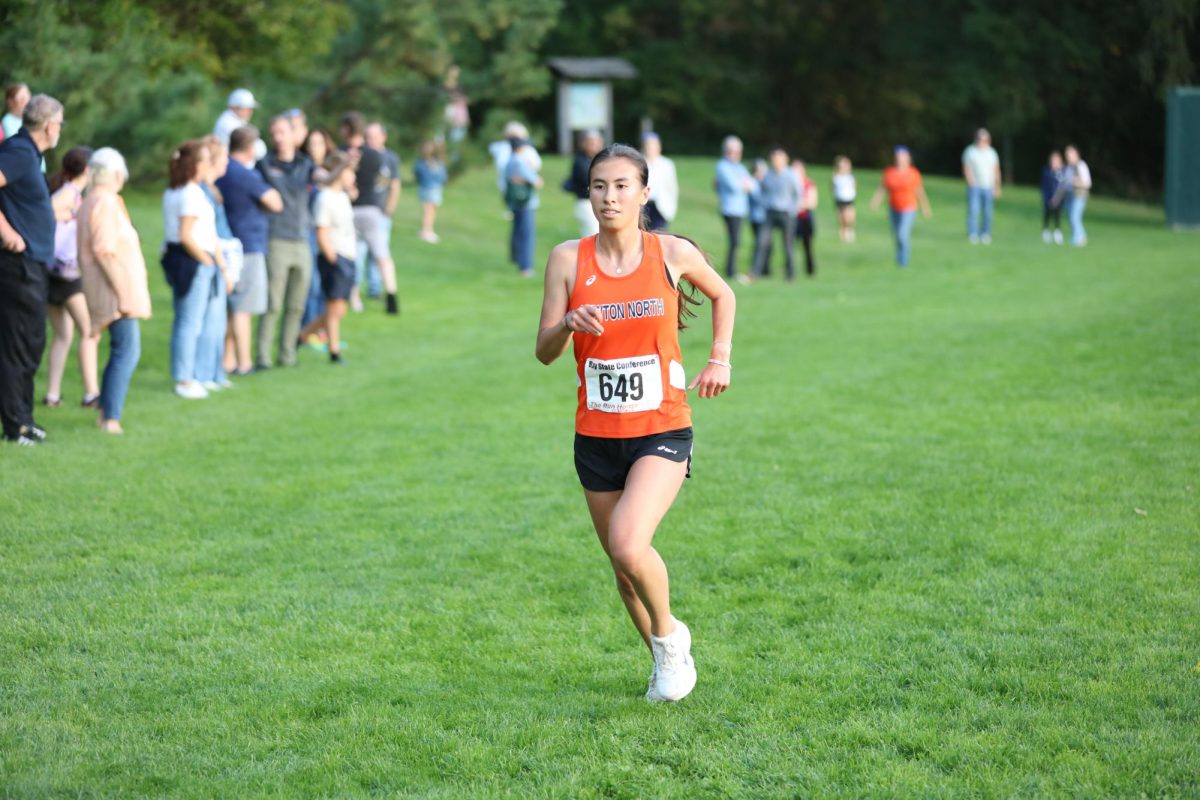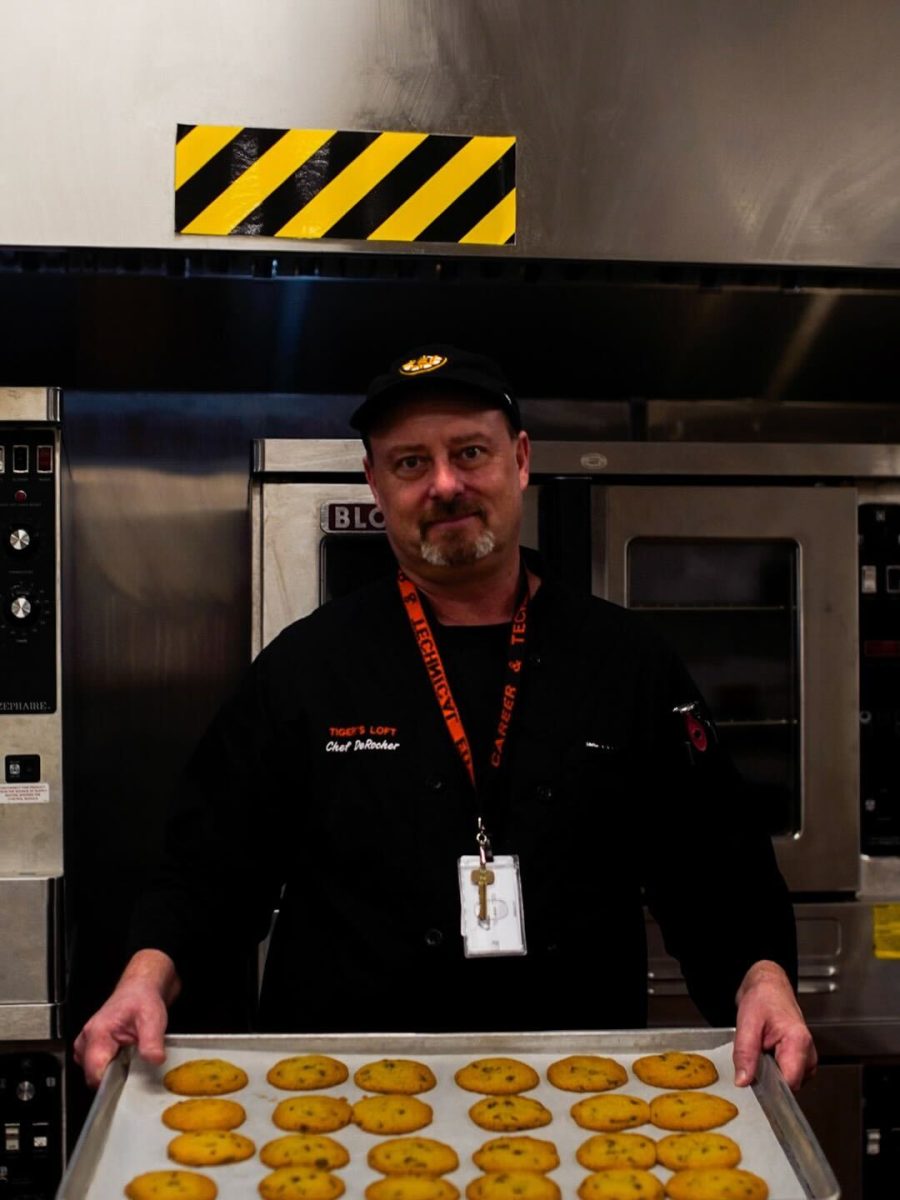 [/media-credit]
[/media-credit]
- Senior Melissa Ruttan works at L’Aroma, a bakery in West Newton, as a part of the Co-op program, which gives students work experience.
by Malini Gandhi
It is 7:50 a.m. on a Wednesday morning, and as the bell for B-block blares through the hallways, senior Melissa Ruttan spoons batter into a bowl in the kitchen of the sleepy bakery L’Aroma, which is tucked behind the brick buildings of West Newton Square.
Ruttan, a culinary major III, is taking advantage of one of the work opportunities offered at this school that seeks to translate years of in-school training into real life experience—frothy cups of coffee, chocolate-chip scones and all.
There are two programs that allow students to apply their skills to paid opportunities and to gain experience in work environments: the Co-op program and the Work Study program, according to Cooperative Education Coordinator and counselor Rachel Sturma, head of both programs.
The Co-op program, which Ruttan participates in, provides students in one of the six Career and Technical Vocational Education departments—Automotive Technology, Carpentry, Culinary Arts, Drafting, Early Education and Care and Graphics—with the opportunity to “take the skills they have learned and actually go out to an employer during their Career and Technical Vocational Education blocks,” according to Sturma.
The second program, Work Study, allows students involved in courses such as Photography and Theatre Arts to take on leadership roles and get paid for fulfilling various duties within the fine and performing arts department.
Co-op program
According to Sturma, the Co-op program is constantly matching the skills and interests of the various Career and Technical Vocational Education students to new connections in the workforce.
In the case of Ruttan, Sturma said that she was the “perfect fit” for Co-op.
“Melissa is very passionate about baking and was actually already employed at L’Aroma prior to taking on the Co-op, which made it very easy. She came up to me and said, ‘Ms. Sturma, I know where I want to my Co-op,’ and that was that.”
Ruttan said that she first found out about the program when Sturma gave a presentation about the opportunity to culinary arts students. Immediately, Ruttan thought that it would be a “very cool way to gain experience.”
According to Ruttan, she received the job at L’Aroma bakery over the summer. When her boss mentioned to her that he needed more help, Ruttan said she proposed to come in to the bakery during a weekday morning as part of the Co-op program.
And for the past semester she has been doing just that. Every Wednesday morning from 7 to 11 during what would normally be three back-to-back culinary arts blocks, Ruttan drives to West Newton and heads in to the warm kitchen at the back of the small bakery.
Ruttan said her experience doing a Co-op at L’Aroma has been “absolutely awesome.”
“I’ve learned so many baking techniques during my time at L’Aroma. When I first got the job, I wasn’t expecting a cooking job at all. I thought I would be working at the counter and making coffee,” Ruttan said. “But on the very first day, my boss handed me a recipe and said, ‘Here, can you make this,’ and since then, I’ve been an assistant baker. They’re really into teaching and training, which is wonderful.”
According to Ruttan, simply the fact that the Co-op program offers “real life, tangible experience in the workforce” makes it an incredible opportunity for students in any branch of the Career and Technical Vocational Education department.
“Anyone who is in a technical field always needs that first person to hire them. No one is usually going to hire a 16-year-old with no experience to bake, but once you have that first job, getting hired after that is much easier,” she said. “The Co-op program provides students with that first opportunity—that foot in the door,” she said.
Senior Mark Gately, an early education and care major who will be doing a Co-op at the preschool at Newton’s Ed Center later this year, also cited gaining experience as a key benefit of the Co-op program.
“I decided to pursue a Co-op because I felt like I needed the experience of working in a different environment than what I have been used to,” Gately said. “I’ll be moving to the Midwest soon after graduation, and the same people I’ve been working with for years won’t be around anymore. The Co-op program is so great because it provides an opportunity to work outside of the classroom and helps you learn how to interact with different people in different situations.”
For example, an opportunity that Gately is looking forward to exploring during the Co-op is working with special education children. According to Gately, he has had some experience babysitting special education kids, but never in an organized setting, and he is looking forward to this “new variety of work.”
While Gately admitted that he was a bit nervous about the upcoming Co-op, he is mostly looking forward to it.
“I visited the Ed Center recently to meet with some of the teachers, and they all seemed very nice. All of the kids seemed awesome,” Gately said.
According to Sturma, the feedback that she has received from students in the Co-op program has been “very positive.”
However, though Ruttan, Gately and other students have been able to pursue successful Co-ops, Sturma noted that the program is “always a work in progress” and that convincing businesses that high school students are viable candidates for jobs can be challenging.
“We are constantly looking to create new opportunities and make contacts with a range of businesses. For example, right now we have a lot of talented architectural drafting students, but few contacts.
“It can be challenging because many businesses we speak to think, ‘high school students?’ and immediately turn away, and it’s been a struggle to convince them to promote high school work and to prove to them the immense talent of these students who have four years worth of training.”
Work Study program
In the school itself, the buzzing theatre and photography courses provide another type of paid work opportunity: Work Study.
In Work Study, students perform various administrative and organizational duties that fulfill the current needs of courses such as art, business, music, photography and theatre.
For example, senior Lior Percher, a photography Work Study student, spends her hours measuring out the chemicals for the darkroom, checking through filter papers, mopping and cleaning the photography classroom and giving advice to less experienced photography students when photography teacher Ron Morris is out of the room.
Instead of working during a specific block, photography Work Study students individually complete their required number of hours whenever they have the chance, a loose structure Percher said she enjoys.
Percher said she was originally drawn to the opportunity simply because “I loved the concept of spending more time in the darkroom.” However, as time progressed, she said the experience proved to give her valuable work skills.
“Work Study has definitely taught me how to manage my time. It is work, and most of us want to do it well, especially if we’re passionate about it,” Percher said. “Another great part about Work Study is that I’ve had the chance to meet and work side-by-side with so many people who are also photography lovers.”
Similarly, senior Katharine Norris raved about her experience as a Work Study student for Theatre Ink.
Among other tasks, as Theatre Ink director Adam Brown’s personal assistant, Norris does reimbursements for the department, takes messages, organizes large program-wide events, helps with ticket sales and puts up posters for upcoming shows.
“Work Study is seriously like a job opportunity. It provides such a learning-conducive environment that I don’t think you can get from employers outside of school,” Norris said. “I don’t plan on doing theatre later in my life, but the people and communication skills I have received from my experience in Work Study are phenomenal.”








































